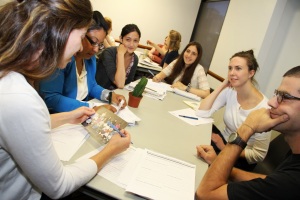These are questions I often hear about Supervised Fieldwork at Bank Street:
- How does Bank Street help you get your placement?
- When do you find out?
- What do you do when you find out?
- How do you survive a year with no income?
- What’s the best part of it?

As I approached the end of my first year of Bank Street, I met with my supervisor about supervised field work placements. I described my previous experience in schools, plus any concerns I had about where I would be placed. Staying in touch over the next few weeks, there were a few forms to fill out, including one that asks where you live in the city. In the late spring, my supervisor organized a get together for students going into supervised field work and those currently in it. In true Bank Street style, snacks and iced tea were provided. The students shared their current experience and fielded questions as well.
Then, in late June or early July, I received an email with my placement information. My supervisor suggested I email the teachers I’d be working with, but warned that I may not hear back until closer to the school year was to begin. That was true, but I took it upon myself to take a look at the school’s website and get to know the schedule and name of the principal. I told both teachers I would start with an email, as well as the principal.
I then had to go to the Department of Education and get fingerprinted (it was at 65 Court St, Brooklyn at the time). I also had to get some paper work done by signing up online with the Department of Education. You have to input the school’s information in your online profile, which you create, and print a letter saying you’re approved. That whole process took about an hour, and it was great to have the whole summer to do it! Then I heard back from the teachers and principal with some starting dates, and enjoyed a week or two more of vacation before starting at the end of August.
The school is very close to where I live, and it really does feel like a good “fit” for me, from a personality and professional standpoint. I feel that my supervisor listened to what I had to say and picked a good school. I am comfortable there but also feel like I am expanding my teaching experience with new challenges. Field work is 4 days a week for me. For some programs it is 3 days a week. The supervised fieldwork is for pretty much all of the school year – it ends in early June. My advisor will come in periodically and observe me teaching a lesson, then give feedback on the spot as well as written notes later.
A big challenge that was on my mind at the time of organizing supervised fieldwork was how I was going to finance myself for the year. I met with the financial aid office ahead of time and they were very helpful in making sure my loan information was correct. Once I filled out some forms there I received a letter with a very clear breakdown of how much money I could receive for living expenses via a GradPlus loan. I requested just enough to cover rent, bills, and groceries. Most grad students I talk to in supervised fieldwork have picked up little odds and ends jobs like tutoring or subbing, coaching or teaching musical lessons after school hours or on the weekends to supplement the living allowance from the loan.
So far, the best part of supervised fieldwork is meeting with my conference group. Every Wednesday, we meet at Bank Street, much like any other class would, but there are only 6 of us and our supervisor. It is a very positive environment that can range from a vent session to serious lesson planning ideas. You’ll be able to reflect, share, and get ideas to try out next time. It’s stress free and I look forward to it very much every week.
Hopefully this answers some of your questions. Many people already have a job before doing this, and that transition is hard for sure. But you’ll quickly get into your new role and routine. I’ll be sure to write again once the experience is over, and talk about the ending of the experience!